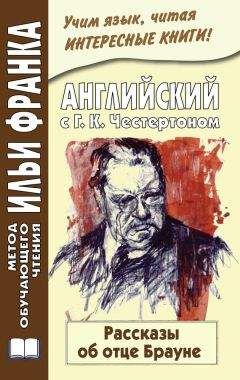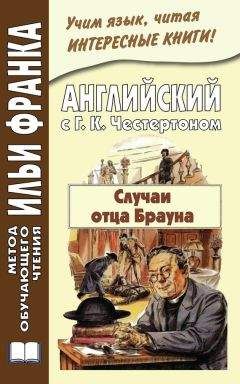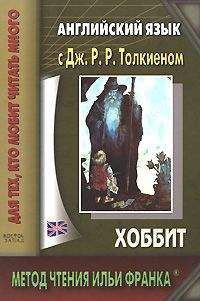In the large entrance hall of the house there was ample room even for Sir Leopold and the removal of his wraps. Porch and vestibule, indeed, were unduly large in proportion to the house, and formed, as it were, a big room with the front door at one end, and the bottom of the staircase at the other. In front of the large hall fire, over which hung the colonel’s sword, the process was completed and the company, including the saturnine Crook, presented to Sir Leopold Fischer. That venerable financier, however, still seemed struggling with portions of his well-lined attire, and at length produced from a very interior tail-coat pocket, a black oval case which he radiantly explained to be his Christmas present for his god-daughter.
With an unaffected vain-glory that had something disarming about it (с искренней хвастливостью, в которой было что-то обезоруживающее; unaffected – простой, непринужденный; искренний; vain-glory – тщеславие; хвастливость; disarming – обезоруживающий; arms – вооружение) he held out the case before them all (он протянул перед всеми ними футляр; to hold); it flew open at a touch and half-blinded them (он /футляр/ легко открылся от прикосновения и почти ослепил их: «ослепил наполовину»; to flow – течь; литься; показывать /легким движением/; touch – прикосновение; to blind – ослеплять). It was just as if a crystal fountain had spurted in their eyes (это было как будто фонтан из кристаллов забил у них перед глазами: «прямо в глаза»; crystal – кристалл; fountain – фонтан; to spurt – бить струей). In a nest of orange velvet lay like three eggs, three white and vivid diamonds (на оранжевом бархате, как в гнезде: «в гнезде из оранжевого бархата» лежали, словно три яйца, три чистых/прозрачных ярких бриллианта; to lie – лежать; vivid – яркий; живой; diamond – алмаз; бриллиант) that seemed to set the very air on fire all round them (которые, казалось, воспламенили сам воздух /везде/ вокруг них; to set on fire – поджечь, поджигать; воспламенять; air – воздух). Fischer stood beaming benevolently and drinking deep of the astonishment and ecstasy of the girl (Фишер стоял, благожелательно сияя, упиваясь изумлением и восторгом девушки; to beam – сиять; лучезарно улыбаться; to drink deep – упиваться; astonishment – изумление; ecstasy – экстаз; восторг), the grim admiration and gruff thanks of the colonel (сдержанным: «суровым» восхищением и немногословной: «угрюмой/неприветливой» благодарностью полковника; grim – жестокий; мрачный; суровый; admiration – восторг; восхищение; gruff – грубоватый; резкий; неприветливый), the wonder of the whole group (изумлением остальных: «всей группы»; wonder – удивление, изумление).
With an unaffected vain-glory that had something disarming about it he held out the case before them all; it flew open at a touch and half-blinded them. It was just as if a crystal fountain had spurted in their eyes. In a nest of orange velvet lay like three eggs, three white and vivid diamonds that seemed to set the very air on fire all round them. Fischer stood beaming benevolently and drinking deep of the astonishment and ecstasy of the girl, the grim admiration and gruff thanks of the colonel, the wonder of the whole group.
“I’ll put ’em back now, my dear (я положу их назад сейчас, моя дорогая; ’em – разг. сокращенная форма от «them»; to put back – вернуть/положить на место; to put – класть),” said Fischer, returning the case to the tails of his coat (сказал Фишер, возвращая футляр в /карман/ фрака; to return – возвращать; класть обратно). “I had to be careful of ’em coming down (я вынужден был быть осмотрительным в отношении них по дороге сюда; to be careful – соблюдать осторожность; быть осмотрительным; to come down – уменьшаться; приезжать /из центра на окраину/). They’re the three great African diamonds called ‘The Flying Stars,’ because they’ve been stolen so often (это три великолепных африканских бриллианта, которые называются «Летучими звездами», потому что их так часто похищали; called – именуемый, называемый; to call – кричать; окликать; to steal – воровать, красть). All the big criminals are on the track (все крупные преступники охотятся за ними; to be on the track – преследовать; напасть на след); but even the rough men about in the streets and hotels could hardly have kept their hands off them (но даже простые: «неотесанные» люди на улицах и в гостиницах едва ли бы отказались от них: «с трудом могли удержать руки от них»; rough – неровный; грубый; бесцеремонный; неотесанный; hardly – едва; едва ли; to keep one’s hands off – не давать волю рукам; to keep – держать; хранить; беречь). I might have lost them on the road here (я мог бы лишиться их по дороге сюда; might – мог бы /в условном наклонении/; to lose – утрачивать, лишаться; терять). It was quite possible (это было вполне возможно; quite – вполне; действительно; possible – вероятный; возможный).”
“I’ll put ’em back now, my dear,” said Fischer, returning the case to the tails of his coat. “I had to be careful of ’em coming down. They’re the three great African diamonds called ‘The Flying Stars,’ because they’ve been stolen so often. All the big criminals are on the track; but even the rough men about in the streets and hotels could hardly have kept their hands off them. I might have lost them on the road here. It was quite possible.”
“Quite natural, I should say (вполне естественно, должен сказать),” growled the man in the red tie (ворчливо заметил человек в красном галстуке; to growl – ворчать; огрызаться). “I shouldn’t blame ’em if they had taken ’em (я не стал бы их винить, если бы они взяли их; to blame – обвинять; возлагать вину). When they ask for bread, and you don’t even give them a stone (когда они /люди/ просят хлеба, а вы не даете им даже камня; to ask for – просить), I think they might take the stone for themselves (я думаю, они могут взять камень сами).”
“I won’t have you talking like that (я не позволю вам так говорить),” cried the girl, who was in a curious glow (воскликнула девушка с необычным жаром; curious – любопытный; любознательный; необычный; glow – горячность; жар). “You’ve only talked like that since you became a horrid what’s-his-name (вы стали так разговаривать только с тех пор, как стали /этим/ ужасным…ну, как его там зовут; horrid – страшный; ужасный; what’s-his-name – ну этот, как его; как его там зовут /разг./). You know what I mean (вы знаете, что я имею в виду). What do you call a man who wants to embrace the chimney-sweep (как называют человека, который хочет обнять трубочиста; to call – кричать; звать; звонить; заходить; называть; to embrace – обнимать/ся/; chimney-sweep – трубочист; chimney – труба; дымоход; to sweep – мести; подметать; прочищать)?”
“A saint (святым),” said Father Brown.
“I think (я думаю),” said Sir Leopold, with a supercilious smile (сказал сэр Леопольд с презрительной улыбкой; supercilious – высокомерный; презрительный), “that Ruby means a Socialist (что Руби имеет в виду социалиста; to mean – подразумевать; иметь в виду; означать).”
“Quite natural, I should say,” growled the man in the red tie. “I shouldn’t blame ’em if they had taken ’em. When they ask for bread, and you don’t even give them a stone, I think they might take the stone for themselves.”
“I won’t have you talking like that,” cried the girl, who was in a curious glow. “You’ve only talked like that since you became a horrid what’s-his-name. You know what I mean. What do you call a man who wants to embrace the chimney-sweep?”
“A saint,” said Father Brown.
“I think,” said Sir Leopold, with a supercilious smile, “that Ruby means a Socialist.”
“A radical does not mean a man who lives on radishes (радикал не означает человека, который питается редиской; to live on – кормиться; radish – редиска),” remarked Crook, with some impatience (заметил Крук с некоторым раздражением; impatience – нетерпение; раздражение), and a Conservative does not mean a man who preserves jam (а консерватор не означает человека, который заготавливает впрок варенье; to preserve – сохранять; заготавливать впрок; консервировать; jam – варенье; джем). Neither, I assure you, does a Socialist mean a man who desires a social evening with the chimney-sweep (также и социалист, я уверяю вас, не означает человека, который мечтает о вечеринке /в обществе/ трубочиста; to assure – уверять, заверять; neither – никакой; также не; to desire – желать, испытывать желание; хотеть). A Socialist means a man who wants all the chimneys swept and all the chimney-sweeps paid for it (социалист означает человека, который хочет, чтобы все трубы были прочищены, а всем трубочистам заплатили за это = заплатили за работу; to sweep – мести; подметать; прочищать; to pay).”
“But who won’t allow you (но который не позволит вам; to allow – позволять, разрешать),” put in the priest in a low voice (вмешался священник тихо; to put in – вмешиваться /в разговор/; in a low voice – вполголоса; тихо; low – низкий; невысокий; voice – голос), “to own your own soot (иметь свою собственную сажу; to own – обладать; владеть; иметь; own – свой, собственный; soot – сажа).”
“A radical does not mean a man who lives on radishes,” remarked Crook, with some impatience; and a Conservative does not mean a man who preserves jam. Neither, I assure you, does a Socialist mean a man who desires a social evening with the chimney-sweep. A Socialist means a man who wants all the chimneys swept and all the chimney-sweeps paid for it.”
“But who won’t allow you,” put in the priest in a low voice, “to own your own soot.”
Crook looked at him with an eye of interest and even respect (Крук взглянул на него с интересом и даже с уважением; eye – глаз; взгляд; respect – уважение). “Does one want to own soot (кому-то нужно владеть сажей = кому-то нужна сажа)?” he asked.
“One might (кому-то может /понадобиться/),” answered Brown, with speculation in his eye (ответил Браун задумчиво: «с размышлением в глазах»; speculation – размышление; рассуждение; раздумье). “I’ve heard that gardeners use it (я слышал, что садовники используют ее; to use – использовать; употреблять). And I once made six children happy at Christmas (а я однажды порадовал: «сделал счастливыми» шесть детишек на Рождество; to make happy – осчастливить; порадовать) when the conjuror didn’t come, entirely with soot – applied externally (когда не пришел фокусник, исключительно при помощи сажи – примененной как наружное средство: «нанесенной снаружи»; conjuror – волшебник; фокусник; to apply – применять; использовать; накладывать; наносить; external – внешний; наружный).”




